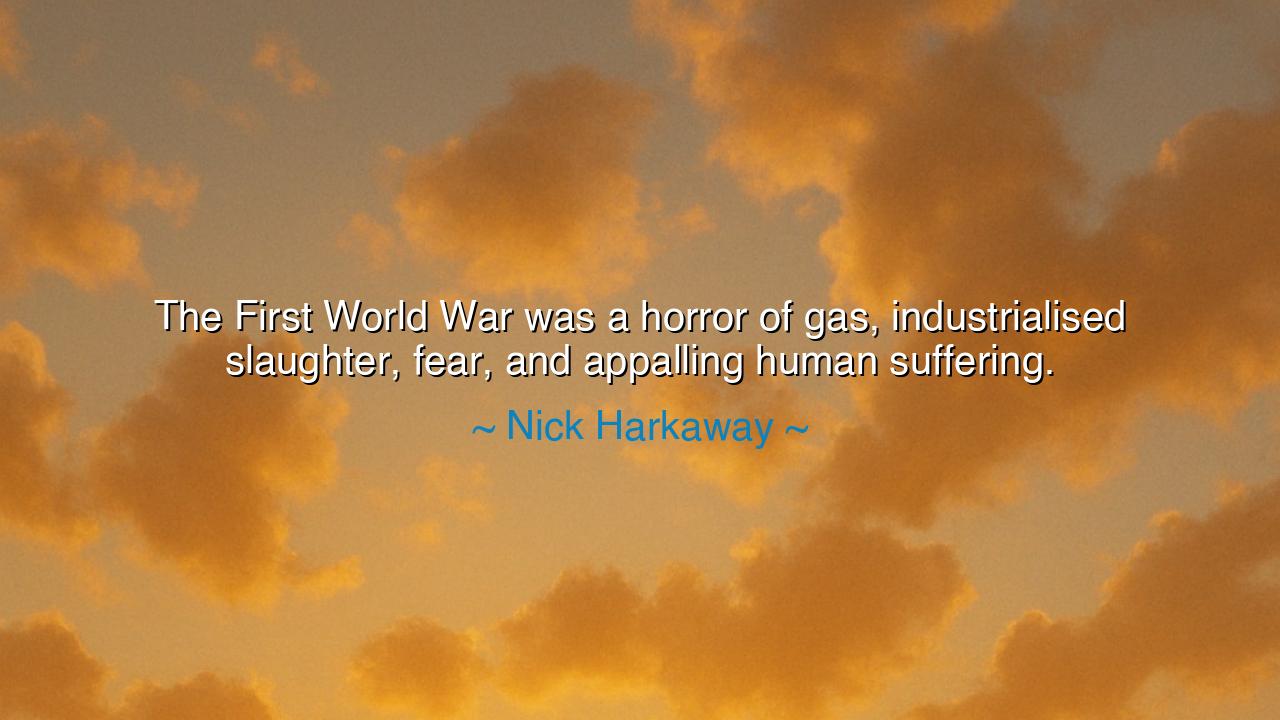
The First World War was a horror of gas, industrialised
The First World War was a horror of gas, industrialised slaughter, fear, and appalling human suffering.






Hear, O seeker of remembrance, the grave words of Nick Harkaway: “The First World War was a horror of gas, industrialised slaughter, fear, and appalling human suffering.” In this brief but searing sentence, he names the essence of a conflict that consumed the world in fire and left behind not glory, but ruin. For the First World War was unlike the wars of old; it was not fought with knights and banners, but with machines, with poison, with endless shells, and with the grinding gears of industry turned toward death.
The origin of this saying rests in the memory of a war that broke out in 1914, when the powers of Europe, bound by pride and entangled alliances, plunged into four years of devastation. Harkaway’s words remind us that this was no noble crusade, but a descent into mechanized carnage. Gas clouds rolled across the trenches, burning lungs and blinding eyes. Industrialised slaughter meant that men no longer faced each other with swords or muskets, but with machine guns, artillery, and tanks that ground human lives like grain beneath a millstone. It was a new age of war, and its harvest was terror.
Consider the tale of the Battle of the Somme in 1916. On the first day alone, the British Army suffered nearly 60,000 casualties, thousands mown down within minutes by machine gun fire. Fields once green were turned into seas of mud and blood, where bodies lay unburied and shells fell without ceasing. The generals called it strategy; the soldiers called it hell. This is the horror Harkaway speaks of—war transformed into a factory of death, where human beings were reduced to numbers, and courage itself seemed powerless against the machines.
The fear was constant, for in the trenches death could come at any hour. A shell might explode without warning; a sniper’s bullet might end a life in silence. Poison gas descended like a phantom, unseen until it choked the breath from a man’s lungs. Night brought no rest, for rats swarmed in the dugouts and the cries of the wounded echoed in the dark. In this war, fear was not the companion of battle alone but the daily bread of every soldier. To live was to endure suffering beyond the reach of words.
And what of the appalling human suffering? Beyond the fields of Europe, families wept for sons who would never return. Millions were maimed, their faces scarred, their bodies broken, their minds haunted by what we now call “shell shock.” Civilians too endured famine, occupation, and grief. The war that was meant to end all wars became the war that shattered a generation, leaving scars that have not faded even a century later. This is why Harkaway speaks not of victory, but of horror.
The deeper meaning of his words is a warning: when pride and ambition drive nations to conflict, and when human ingenuity is harnessed not for creation but for destruction, the result is not honor but catastrophe. The First World War unveiled the terrible truth that modern progress, without wisdom, only multiplies death. What was once fought with sword and shield was now fought with factories and science, and the scale of human suffering grew beyond comprehension.
Therefore, O listener, carry this lesson into your heart. Do not be deceived when men speak lightly of war, as if it were a game or a path to glory. Remember the gas, the slaughter, the fear, and the suffering. Demand wisdom of your leaders; resist the songs of pride that lead to ruin. And in your own life, let your strength be used for building, not destroying; for healing, not wounding. For if the First World War teaches us anything, it is that once unleashed, the machinery of destruction cannot be easily tamed, and its victims are countless.






BYBao Yy
The description of World War I as a 'horror of gas, industrialized slaughter, fear, and appalling human suffering' feels chilling and profound. It’s a stark reminder of the impact war has on human lives. How can societies prevent the use of such brutal weapons in future conflicts? Is there a way to ensure that leaders, past and present, fully understand the weight of their decisions and the lives they affect?
NTNguyen Thao
Harkaway’s words capture the unspeakable violence and terror of World War I. The idea of 'industrialized slaughter' and the use of gas as a weapon reminds us that war is not just about battles but about the pain and suffering of those involved. It makes me wonder, have we truly learned from the mistakes of the past, or are we still trapped in the same cycle of violence and dehumanization?
NHNguyen Nhu Huyen
This quote paints a haunting image of World War I, reminding us of the horrors of industrialized war and the appalling suffering it caused. It makes me question the role of technological advancements in warfare—do they make war more efficient, or do they just amplify human suffering? Could the modern military-industrial complex be breeding similar horrors today, under the guise of progress and necessity?
NAThai Ngoc Anh
Nick Harkaway’s description of World War I emphasizes the true horror of war, highlighting the devastating impact of new technologies like gas warfare. How can we ever truly understand the scale of suffering that occurred during this time? What lessons can we learn from the brutal realities of war to ensure such atrocities are never repeated? Can we move forward while remembering the trauma of past wars?